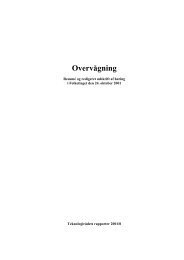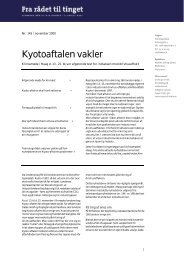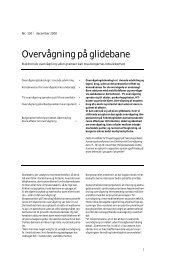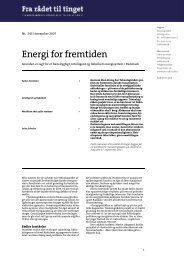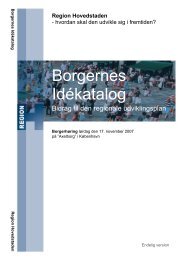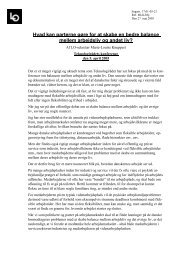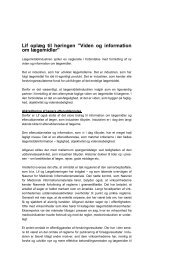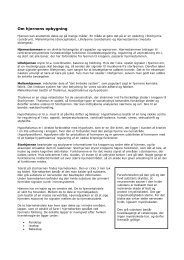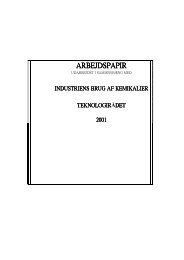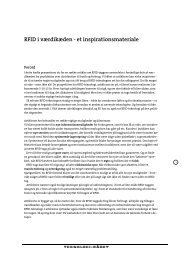Energi i fremtiden - globale, regionale og nationale ... - Teknologirådet
Energi i fremtiden - globale, regionale og nationale ... - Teknologirådet
Energi i fremtiden - globale, regionale og nationale ... - Teknologirådet
You also want an ePaper? Increase the reach of your titles
YUMPU automatically turns print PDFs into web optimized ePapers that Google loves.
56<br />
SPURIOUS RESERVE REVISIONS<br />
Abu Dubai Iran Iraq Kuwait Neutral Saudi Venezuela<br />
private companies. In 1985, Kuwait<br />
reported a 50% increase to its re-<br />
Dhabi<br />
Zone Arabia<br />
serves overnight although nothing<br />
1980<br />
1981<br />
1982<br />
28.0<br />
29.0<br />
30.6<br />
1.4<br />
1.4<br />
1.3<br />
58.0<br />
57.5<br />
57.0<br />
31.0<br />
30.0<br />
29.7<br />
65.4<br />
65.9<br />
64.5<br />
6.1<br />
6.0<br />
5.9<br />
163.4<br />
165.0<br />
164.6<br />
17.9<br />
18.0<br />
20.3<br />
particular changed in the oilfields. It<br />
did so to increase its OPEC produc-<br />
1983 30.5 1.4 55.3 41.0 64.2 5.7 162.4 21.5 tion quota, which was based on<br />
1984<br />
1985<br />
1986<br />
30.4<br />
30.5<br />
30.0<br />
1.4<br />
1.4<br />
1.4<br />
51.0<br />
48.5<br />
47.9<br />
43.0<br />
44.5<br />
44.1<br />
63.9<br />
90.0<br />
89.8<br />
5.6<br />
5.4<br />
5.4<br />
166.0<br />
169.0<br />
168.8<br />
24.9<br />
25.9<br />
25.6<br />
reserves. Then three years later,<br />
Venezuela doubled its reported re-<br />
1987 31.0 1.4 48.8 47.1 91.9 5.3 166.6 25.0 serves by the inclusion of large<br />
1988<br />
1989<br />
1990<br />
92.2<br />
92.2<br />
92.2<br />
4.0<br />
4.0<br />
4.0<br />
92.9<br />
92.9<br />
92.9<br />
100.0<br />
100.0<br />
100.0<br />
91.9<br />
91.9<br />
91.9<br />
5.2<br />
5.2<br />
5.0<br />
167.0<br />
170.0<br />
257.5<br />
56.3<br />
58.1<br />
59.1<br />
amounts of long-known heavy oil<br />
that had not previously been re-<br />
1991<br />
1992<br />
1993<br />
1994<br />
92.2<br />
92.2<br />
92.2<br />
92.2<br />
4.0<br />
4.0<br />
4.0<br />
4.3<br />
92.9<br />
92.9<br />
92.9<br />
89.3<br />
100.0<br />
100.0<br />
100.0<br />
100.0<br />
94.5<br />
94.0<br />
94.0<br />
94.0<br />
5.0<br />
5.0<br />
5.0<br />
5.0<br />
257.5<br />
257.9<br />
258.7<br />
258.7<br />
59.1<br />
62.7<br />
63.3<br />
64.5<br />
ported. This led Iraq, Iran, Dubai,<br />
Abu Dhabi and later Saudi Arabia to<br />
retaliate with huge increases to<br />
1995<br />
1996<br />
1997<br />
1998<br />
92.2<br />
92.2<br />
92.2<br />
92.2<br />
4.3<br />
4.0<br />
4.0<br />
4.0<br />
88.2<br />
93.0<br />
93.0<br />
89.7<br />
100.0<br />
112.0<br />
112.5<br />
112.5<br />
94.0<br />
94.0<br />
94.0<br />
94.0<br />
5.0<br />
5.0<br />
5.0<br />
5.0<br />
258.7<br />
259.0<br />
259.0<br />
259.0<br />
64.9<br />
64.9<br />
71.7<br />
72.6<br />
protect their quotas. Some revision<br />
was called for, as the earlier<br />
estimates were too low, having been<br />
1999<br />
2000<br />
2001<br />
92.2<br />
92.2<br />
92.2<br />
4.0<br />
4.0<br />
4.0<br />
89.7<br />
89.7<br />
89.7<br />
112.5<br />
112.5<br />
112.5<br />
94.0<br />
94.0<br />
94.0<br />
5.0<br />
5.0<br />
5.0<br />
261.0<br />
259.2<br />
259.3<br />
72.6<br />
76.9<br />
77.7<br />
inherited from the private<br />
companies before they were<br />
2002 92.2 4.0 89.7 112.5 94.0 5.0 259.3 77.8 expropriated. But the revisions,<br />
Anomalous increase underlined. Note also implausible unchanged estimates.<br />
whatever the right number might<br />
be, have to be backdated to the discovery of the fields concerned, which had been made up to fifty years<br />
before. In total about 300 billion barrels were added in this way during the late 1980s, greatly distorting<br />
the apparent discovery record. It is noteworthy too that in several cases the reported reserves remain<br />
implausibly unchanged for years on end despite production. It is staggering that such obviously flawed<br />
information is recorded in the public database, substantially without comment or qualification.”<br />
The following statement from the Outlook is explicit: “Reserves data from the main public sources are not<br />
“backdated”. In other words, the historical time series of reserves for a given country is not revised in<br />
light of new discoveries or increases in recovery rates”.<br />
The need for proper back-dating has long been stressed by ASPO and figure 8 shows the backdated data<br />
from reference [4].<br />
Figure 8: Current trend of discovery according to<br />
BP compared with backdated revisions.<br />
Many analysts assume the estimates reported in the BP Statistical Review have at least the tacit blessing<br />
of a knowledgeable and prestigious oil company. They do not, as footnotes in the publication make plain.



